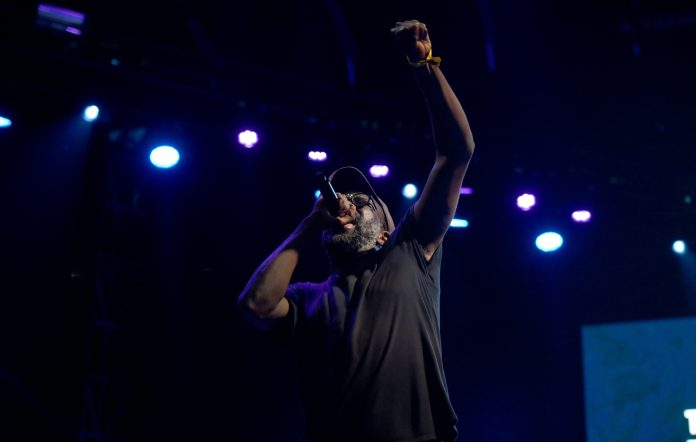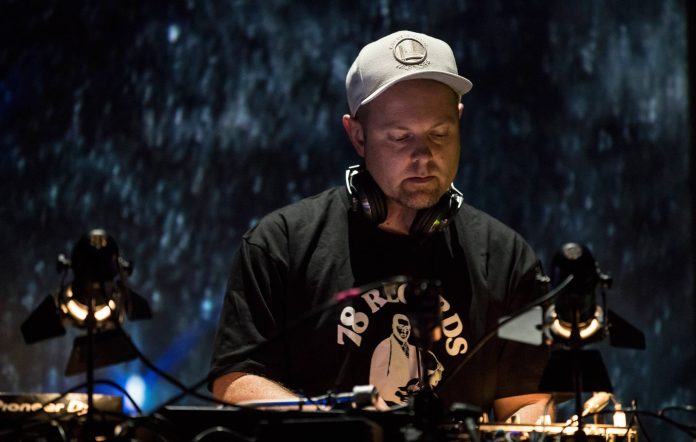
TV On The Radio performed their classic debut single ‘Staring At The Sun’ on US TV last night (November 21) – watch the video below.
The New York band delivered an energetic rendition of the 2004 song while appearing as the musical guests on yesterday’s edition of NBC’s The Tonight Show Starring Jimmy Fallon.
It came in support of the new 20th anniversary reissue of the group’s 2004 first album ‘Desperate Youth, Blood Thirsty Babes’ – which boasts five bonus tracks, including an unreleased song called ‘Dry Drunk Emperor’.
After being introduced by host Fallon, TV On The Radio treated the studio audience and viewers at home to a powerful outing of ‘Staring At The Sun’. They were illuminated by blazing orange lights that flickered rapidly throughout – matching the intensity of the live performance.
One fan wrote in the comments section: “Amazing! I got chills watching this. Somehow they made the original song sound even better.” Another person said: “Since the first time I heard it up to now, ‘Staring At The Sun’ is still the same emotion-soaked fever dream that gets me crying and singing at the same time.”
Tune in here:
Next week, TV On The Radio will play some reunion shows in New York before taking to the stage in Los Angeles and London in December. They’ll also perform at Primavera Sound in Barcelona next summer, and support Khruangbin at their huge outdoor gig at London’s Gunnersbury Park.
Back in September, the group played their first live concert together in over five years. TV On The Radio had teased their comeback on social media over the summer. Their fifth and most recent studio album, ‘Seeds’, was released in 2014.
Last month saw frontman Tunde Adebimpe share his debut solo single, ‘Magnetic’. It’ll appear on his forthcoming first album – which is due to arrive at some point next year via Sub Pop.
A press release about the new ‘Desperate Youth…’ reissue said the original record was “full of rich, bruising ideas about life, love and loss”.
It continued: “Lyrically but especially sonically, ‘Desperate Youth’ captured the dystopian hum of post-9/11 America (a war in Iraq, a proto-right-wing political regime, a surveillance state threatening personal agency at home), putting a voice to the general unease young people felt at the time.”

DJ Shadow has shared his thoughts on the current touring crisis, saying the industry is close to “extinction”.
Writing on Facebook on Wednesday (November 20), DJ Shadow reflected on his recent tour, saying it was “decidedly different from prior runs, in both positive and negative ways.”
“I found myself constantly weighing the changes, not only as they affect me, but other musicians and the touring industry as a whole,” he added, highlighting an increase in costs associated with touring. “It’s also WAY more expensive to get from point A to point B. I joke about it with my crew sometimes, but it’s true: almost all of my money goes to the travel sector.
“And yet, I’m also aware that many of the venues I played this year are struggling financially. I don’t think it’s an over exaggeration to say that the touring industry as we know it is one more global crisis away from extinction.”
He went on to highlight the physical impact of touring, saying: “At my age, touring ain’t as easy as it used to be. There’s aches and pains that didn’t used to be there, and it takes a total commitment to conserve energy for the show; not always easy when sleep or nourishment become disrupted.”
He concluded, writing: “So where does that leave us? Well, for myself, I can only control my own thoughts and actions. I still love touring, still love making music. After the Australia and Japan dates next February, it’ll be time to build something new, and when I’m ready to head back out, I hope the promoters, venues, and fans will still be there.
“Until then, I’ll continue to appreciate every opportunity as it comes… and maybe check out a show or two to remind myself what a precious and powerful thing live entertainment can be.”
Shadow’s comments point to a wider crisis facing the touring industry. For venues, 2023 proved to be “disastrous” and the worst year on record with 125 grassroots music venues shutting their doors. This is despite recent findings that the music industry contributed a record £7.6billion to the country’s economy the same year.
Music Venue Trust (MVT) has also suggested we’re facing a potential “complete collapse of touring” as a result of the recent budget announcement that introduces £7million in new premises taxes. MVT says that this will place 350 grassroots music venues at immediate risk of closure – threatening more than 12,000 jobs, over £250million in economic activity and the loss of over 75,000 live music events.
In hopes of securing a future for live music, the government recently backed a levy on gigs at arena level that will see the UK’s smaller venues and rising artists receive a contribution from bigger gigs.
The model, similar to the one seen in the Premiere League of football and already in use in several countries across Europe, was recommended by MPs after a DCMS investigation back in Spring.
Major artists like Coldplay, Enter Shikari, Sam Fender and most recently Katy Perry have all adopted a levy on their upcoming UK tours, and now there are increased calls for a clear deadline for the industry to take urgent action.

The closures of venues create a larger issue in the industry, impacting touring artists trying to reach new audiences and gig-goers seeking new music.
Earlier this year, David Martin of the FAC – a trade union body representing the needs of musicians and artists in the UK, wrote to NME to highlight this, saying that even if venues remain open, many artists can no longer afford to play them.
“Even those playing to relatively modest audiences have to bear substantial costs to tour the UK – from transportation, accommodation and rehearsals to paying the salaries of musicians, crew, production, agents and managers,” he said. “That’s on top of recording, and the increasing demands of promotion – all activities which create the demand for shows in the first place.”
This was echoed by English Teacher‘s Lily Fontaine earlier this year, when she spoke at a Parliamentary session, and explained how artists are facing “a crisis in terms of funding” and being able to support themselves.
“There is a lack of funding for musicians to create music,” said Fontaine. Giving a long list of outgoing expenses faced by artists, Fontaine mentioned studio time, rehearsal space, tour managers, engineers, van hire, musicians, non-artist fees, driver fees, accommodation, travel, carnets, visas, insurance, equipment, food, drink and photography to name a few.
Elsewhere, at the start of this year, artists reflected on the challenges they faced in 2023 and their hopes for 2024. This included hopes for a streaming royalties reform, the application of AI in music, the 100 Per Cent Venues campaign to end punitive commissions on merchandise sales, and the #LetTheMusicMove campaign to encourage friction-free international touring.